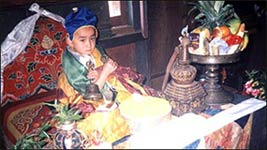|
Ceremony
for reincarnate trulku |
 |
Bhutan's
Culture: Dzongkha |
|
 |
Bhutan Information |
|
|
 |
|
Thimphu:
Investiture ceremony held for reincarnate trulku
|
 |
| A
five-year-old boy was formally accepted as the reincarnation of Gyelwa
Shacha Rinchen, a highly revered 18th century Buddhist lam who was Bhutan's
Je Khenpo for 11 years. The investiture ceremony of the young Trulku, born
Ngawang Tenpey Nyenjyed, was held at the Phajoding monastery in Thimphu,
coinciding with the first day of the fourth Bhutanese month (Saga Dawa).
The ceremony was performed by former Dorji Lopon Yonten Gyeltshen and senior
monks of the central monastic body. The investiture ceremony was
preceded by the award of Tashi-khadar (scarf) by His Holiness the
Je Khenpo Trulku Jigme Choeda on the tenth day of the third Bhutanese month
at Punakha dzong. |
 |
|
Trulku
Ngawang Tenpey Nyenjyed |
|
Trulku
Ngawang Tenpey Nyenjyed will soon join the Nalanda shedra under the tutelage
of former Dorji Lopon Yonten Gyeltshen. Gyalwa Shacha Rinchen was born
in 1710 at Sha Rueb Tshamchongkha, Wangduephodrang. During his tenure as
the Je Khenpo he built the Thubten Jagoed Phungpoi dzong at Phajoding
in 1750, the Nalanda Tshuglhakhang (adjacent to Thinleygang, Toebesa) in
1755 and Dorjiden Tshuglhakhang at Norbgang in Punakha in 1757.
Trulku
Ngawang Tenpey Nyenjyed was born to Trulku Geduen Chophel of Pelchenling
monastery, Wangduephodrang, and Namgyel Pelmo from Shengana in Punakha.
|
Jangsa
Gonpa-Kalimpong: A trust to save animals
|
 |
Lam
Kunzang Dorji, the abbot of Jangsa Gonpa in Kalimpong, who became known
for saving hundreds of bulls, cows, yaks and goats from the clutches and
blades of the butchers, has taken his tshethar (Buddhist practice of saving
animal lives) crusade a step further. He is the inspiration and driving
force behind the Jangsa Animal Saving Trust, a non-profit organisation
formed with the sole aim of assisting and promoting the tshethar initiative
in Bhutan. "The ultimate aim of the trust is to prevent killing. In the
cycle of life, animals have been our parents and we should treat them with
respect and sympathy," the abbot said.
The
idea for a trust developed when donations started pouring in from Sikkim,
Kalimpong and Bhutan as news about Lam Kunzang's act of compassion spread
in the region. After the movement reached Thimphu in early March this year,
contributions rose substantially. In little over two months, the trust
had collected about Nu 400,000. Members as well as non-members had contributed
generously.
One
member had even donated a truck. Others had given money running into hundreds
of thousands singly and collectively. They plan to rely more on awareness
and sensitization campaigns in the future. They have proposals to print,
publish and circulate books, pamphlets, cartoons, comics and make films
"on the demerits of eating meat". They even plan to publish vegetarian
cookery books and distribute them to the public. "Bhutanese have the habit
of saying "we can't cook without sha sey," an active founder member
of the trust said. "We want to show and tell people that it is possible
to cook meals without meat and to enjoy them.
Researches
and studies have also shown that meat is not necessarily the best or the
healthiest food." The abbot stated that the Jangsa trust did not intend
to criticize or censure those who ate meat.
| Information on Bhutan |
 |
|



